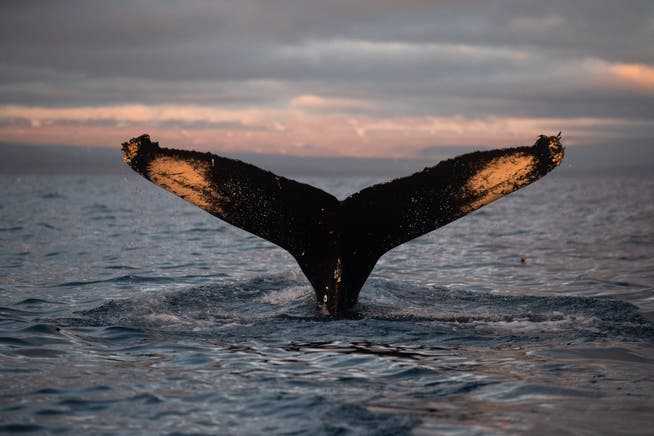Peaceful times await Iceland’s minke and fin whales as the government plans to ban commercial whaling. The industry can cope, because the business has become unprofitable due to a lack of demand.
A ship with whale watchers off the north coast of Iceland.
In Iceland, whales should in future only be photographed and filmed instead of being hunted and killed. Fisheries Minister Svandis Svavarsdottir announced in a statement on Friday Guest commentary of the newspaper «Morgunbladid» states that the government sees no reason to extend the catch quotas in place until 2023. Before taking a final decision, the government wants to examine the potential economic and social consequences of a ban on commercial whaling.
The left-green politician referred to the fact that the whalers had hardly been active in recent years and the unprofitable branch of industry had become meaningless. The catch quota of 209 fin whales and 217 minke whales per year, which has been in effect since 2019, remained practically unused. Only last summer was an animal killed.
1500 whales killed
According to Svavarsdottir, the controversial whale hunt also harms Iceland’s reputation, even if this effect is difficult to measure. The island nation has transformed into a popular tourist destination over the past decade. Before the boom was slowed down by the corona virus, over two million tourists were vacationing on the breathtaking island of 370,000 people. In addition to volcanoes, geysers, warm springs, waterfalls, fjords and lunar landscapes, whale watching has become a fixture on the agenda of many travelers to Iceland. According to the Ice Whale organization, a fifth of all tourists go whale watching.
In 2018, the Icelandic fishing company Hvalur caused global outrage when pictures of a killed pregnant fin whale have been made public, as well as those of an animal that experts have identified as a blue whale – a critically endangered species that must not be hunted. For whale safari operators, but also for nature conservation organizations, Svavarsdottir’s announcement that commercial hunting will end in 2024 is cause for celebration.
After Iceland resumed whaling for scientific purposes in 2003, it also began commercial whaling in 2006. The country was no longer committed to the hunting ban imposed twenty years earlier by the International Whaling Conference (IWC).

Tail fin of a humpback whale cruising off Iceland’s capital, Reykjavik.
Since then, the Atlantic island according to IWC 852 fin whales and 653 minke whales killed. Three years ago, Iceland’s last two whaling companies announced they would forego the upcoming fishing season; they justified this primarily with weak demand and high costs for catching, processing and exporting. The corona distance rules in the fish factories contributed to the fact that the other fishing seasons were also cancelled.
In Iceland, whale meat is no longer a staple of the population – the very protein-rich meat can almost only be found on the menu of a few restaurants. Most of Iceland’s harvest is exported to Japan, where the appetite for whale meat has also been declining for decades. In the 1950s it covered almost half of the protein requirements of the war-torn population, the Japanese still eat it today 40 grams of whale meat per capita and year.
These quantities are covered by domestic fishing fleets, which the Japanese government is helping with subsidies worth millions. When Hvalur last shipped fin whale meat to Japan in 2018, a large part of it is said to have ended up in cold storage due to a lack of demand and later in the garbage.
Japan and Norway continue to hunt
If Iceland goes through with the hunting ban, Norway and Japan will be the only nations in the world still engaged in commercial whaling. Japan left the IWC in 2019, having previously sent its fishing fleets out into the sea “only” for scientific purposes – a supposed cover to supply Japan’s fish markets and restaurants with whale meat. In 2020, the country fell a fifth short of the national quota with 307 animals killed.
Norway killed 575 minke whales last year, the highest number it has had in a long time. Unlike Japan, Norway had never committed itself to the international fishing ban. Animal protection organizations criticize Norway’s attitude as paradoxical, since it is one of the richest countries in the world thanks to its oil and gas reserves and is not dependent on whaling. The Scandinavian country meanwhile, refers to its millennia-old tradition and considers the annual catch rate of 1,278 animals to be sustainable in view of a population of over 100,000 minke whales.
